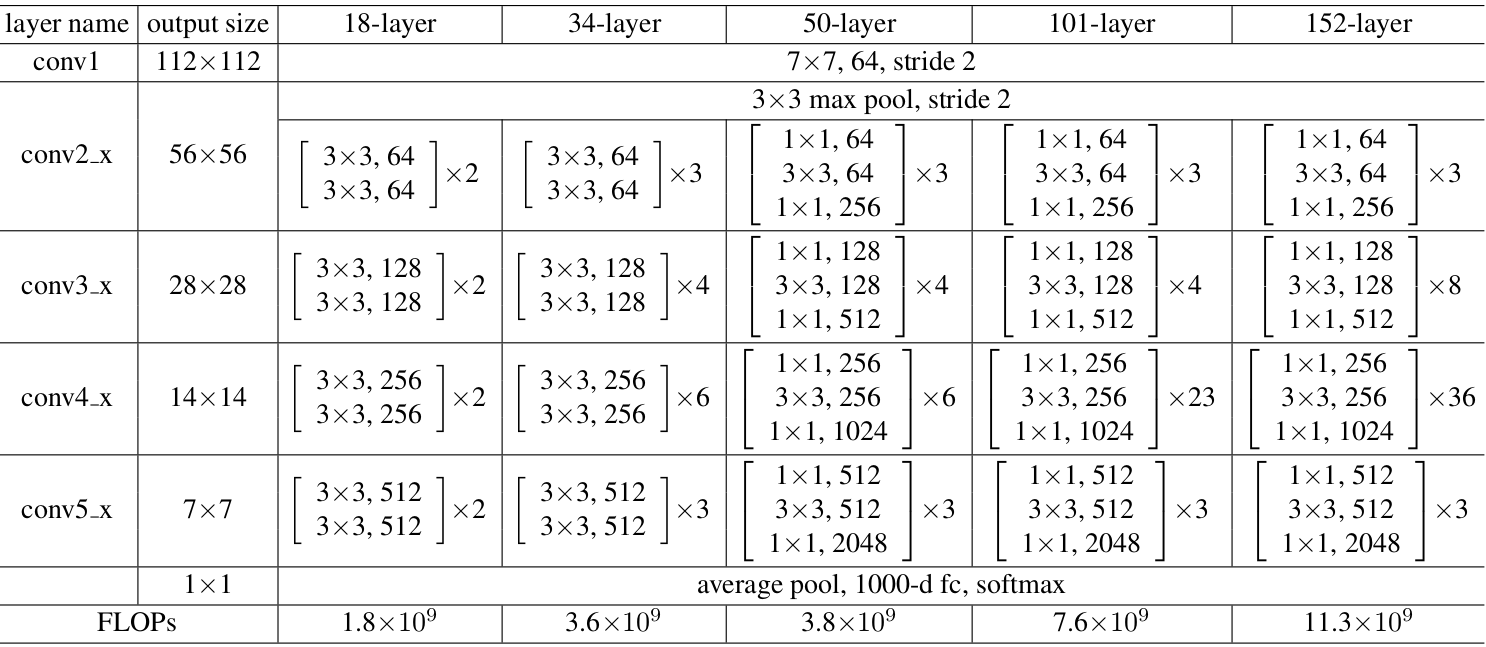Building a resnet from scratch When building custom object detection pipelines, there is often a need to build/modify existing backbone networks. Resnet is a network that is commonly used in such models. However, once you modify the structure it gets difficult to use pre-trained weights. In this article I'll try to make the process easier by building a resnet from scratch. I use the naming convention of pre-trained keras networks to make the transfer easier. Once the model has been modified as per the usecase, we can copy the remaining weights from a pre-trained model(whichever applicable) Features: Notice the number of parameters have reducedResnet builder from scratch


import tensorflow as tf
import cv2
import numpy as np
from tensorflow.keras.layers import *
from tensorflow.keras.applications import ResNet50
from tensorflow.keras.models import *
class Basic_Block(tf.keras.layers.Layer):
"""
X
|
|--skip_block
| |
| conv(3x3)->bn->relu
| |
| conv(3x3)->bn->relu
|- + -|
|
v
RELU( X(residual) + skip_block )
Basic_Block: resnet-18,34 -> shortcut connections skips 2 layers (skip_block)
Bottleneck_Block: resnet 50,101 etc -> shortcut connections skips 3 layers (skip_block)
yet to implement
"""
class Bottleneck_Block(tf.keras.layers.Layer):
"""
X
|
|--skip_block
| |
| conv(1x1)->bn->relu
| |
| conv(3x3)->bn->relu
| |
| conv(1x1)->bn
|- + -|
|
v
RELU( X(residual) + skip_block )
Basic_Block: resnet-18,34 -> shortcut connections skips 2 layers (skip_block)
Bottleneck_Block: resnet 50,101 etc -> shortcut connections skips 3 layers (skip_block)
"""
def __init__(self, num_filters, modify_conv=True, stride=1, idx=[None,None]):
stage_idx, block_idx = [str(i) for i in idx]
super().__init__(name=f'RESNET_BLOCK_{stage_idx}_{block_idx}') #name=f'resnet_block_{stage_idx}_{block_idx}'
self.num_filters = num_filters
self.conv_name_base = f'conv{stage_idx}_block{block_idx}_'
self.bn_name_base = f'conv{stage_idx}_block{block_idx}_'
self.conv1 = Conv2D(filters=num_filters, kernel_size=1, strides=1, padding="same", name=self.conv_name_base+'1_conv')
self.bn1 = BatchNormalization(epsilon=1.001e-5, name=self.bn_name_base+'1_bn')
self.conv2 = Conv2D(filters=num_filters, kernel_size=3, strides=stride, padding="same", name=self.conv_name_base+'2_conv')
self.bn2 = BatchNormalization(name=self.bn_name_base+'2_bn')
self.conv3 = Conv2D(filters=num_filters*4, kernel_size=1, strides=1, padding="same", name=self.conv_name_base+'3_conv')
self.bn3 = BatchNormalization(name=self.bn_name_base+'3_bn')
self.relu = ReLU()
self.modify_conv = modify_conv
if self.modify_conv:
self.modify_conv_block = tf.keras.Sequential([
Conv2D(filters=num_filters*4, kernel_size=1, strides=stride, name=self.bn_name_base+'0_conv'),
BatchNormalization(name=self.bn_name_base+'0_bn')
])
def call(self, x, training=None, **kwargs):
residual = x
if self.modify_conv:
residual = self.modify_conv_block(x)
x = self.conv1(x)
x = self.bn1(x, training=training)
x = self.relu(x)
x = self.conv2(x)
x = self.bn2(x, training=training)
x = self.relu(x)
x = self.conv3(x)
x = self.bn3(x, training=training)
out = Add()([residual, x])
out = self.relu(out)
return out
def get_config(self):
cfg = super().get_config()
return cfg
def summary(self):
x = Input(shape=(224,224,self.num_filters*4))
model = tf.keras.models.Model(inputs=[x], outputs=self.call(x))
return model.summary()
class Build_ResNet(tf.keras.Model):
def __init__(self, block_type, num_filters_list = [64,128,256,512], num_blocks=[3,4,6,3] ,num_classes=1000):
super().__init__()
self.expansion_factor = 4
self.num_filters_pre_block = 64
self.resnet_stage_1 = tf.keras.Sequential([
Conv2D(filters=64, kernel_size=7, strides=2, padding="valid", name="conv1_conv"),
BatchNormalization(name="conv1_bn"),
ReLU(),
MaxPool2D(pool_size=3, strides=2, padding="same")
])
self.resnet_stage_2 = self._make_resnet_stage(block_type,num_filters_list[0],num_blocks[0],stride=1,stage_idx=2)
self.resnet_stage_3 = self._make_resnet_stage(block_type,num_filters_list[1],num_blocks[1],stride=2,stage_idx=3)
self.resnet_stage_4 = self._make_resnet_stage(block_type,num_filters_list[2],num_blocks[2],stride=2,stage_idx=4)
self.resnet_stage_5 = self._make_resnet_stage(block_type,num_filters_list[3],num_blocks[3],stride=2,stage_idx=5)
self.avgpool = GlobalAveragePooling2D()
self.fc = Dense(units=num_classes, activation=tf.keras.activations.softmax, name="predictions")
def _make_resnet_stage(self, block_type, num_filters, num_blocks, stride=1, stage_idx=None):
modify_conv = False
# tf.print(f"stride:{stride},num_filters:{num_filters},num_filters_pre_block:{self.num_filters_pre_block},modify_conv:{modify_conv}")
# if stride==2 or num_filters!= self.num_filters_pre_block*self.expansion_factor:
if stride==2 or self.num_filters_pre_block != num_filters*self.expansion_factor:
modify_conv=True
residual_blocks = []
residual_blocks.append(block_type(num_filters, modify_conv, stride, idx=[stage_idx, 1]))
# tf.print(stage_idx,1, f"num_filters:{num_filters}, modify_conv:{modify_conv}, stride:{stride}")
self.num_filters_pre_block *= self.expansion_factor
modify_conv=False
for i in range(1,num_blocks):
residual_blocks.append(block_type(num_filters, modify_conv, stride=1, idx=[stage_idx, i+1]))
# tf.print(stage_idx,i+1, f"num_filters:{num_filters}, modify_conv:{modify_conv}, stride:{stride}")
resnet_stage = tf.keras.Sequential(residual_blocks)
return resnet_stage
def call(self,x):
x = self.resnet_stage_1(x)
x = self.resnet_stage_2(x, training=True)
x = self.resnet_stage_3(x, training=True)
x = self.resnet_stage_4(x, training=True)
x = self.resnet_stage_5(x, training=True)
x = self.avgpool(x)
output = self.fc(x)
return output
def get_config(self):
cfg = super().get_config()
return cfg
def summary(self):
x = Input(shape=(224, 224, 3))
model = Model(inputs=[x], outputs=self.call(x))
return model.summary()
class ResnetModels():
"""https://github1s.com/keras-team/keras-applications/blob/bc89834ed36935ab4a4994446e34ff81c0d8e1b7/keras_applications/resnet_common.py#L463"""
basic_block = Basic_Block
bottleneck_block = Bottleneck_Block
bottleneck_block_v2 = None
num_classes = 1000
def ResNet50(num_classes=num_classes):
block_type = ResnetModels.bottleneck_block
num_filters_list = [64,128,256,512]
num_blocks=[3,4,6,3]
return Build_ResNet(block_type,
num_filters_list=num_filters_list,
num_blocks=num_blocks,
num_classes=num_classes)
def ResNet101(num_classes=num_classes):
block_type = ResnetModels.bottleneck_block
num_filters_list = [64,128,256,512]
num_blocks=[3,4,23,3]
return Build_ResNet(block_type,
num_filters_list=num_filters_list,
num_blocks=num_blocks,
num_classes=num_classes)
def ResNet152(num_classes=num_classes):
block_type = ResnetModels.bottleneck_block
num_filters_list = [64,128,256,512]
num_blocks=[3,8,36,3]
return Build_ResNet(block_type,
num_filters_list=num_filters_list,
num_blocks=num_blocks,
num_classes=num_classes)
def ResNet50V2(num_classes=num_classes):
block_type = ResnetModels.bottleneck_block_v2
num_filters_list = [64,128,256,512]
num_blocks=[3,4,6,3]
return Build_ResNet(block_type,
num_filters_list=num_filters_list,
num_blocks=num_blocks,
num_classes=num_classes)
def ResNet101V2(num_classes=num_classes):
block_type = ResnetModels.bottleneck_block
num_filters_list = [64,128,256,512]
num_blocks=[3,4,23,3]
def ResNet152V2(num_classes=num_classes):
block_type = ResnetModels.bottleneck_block
num_filters_list = [64,128,256,512]
num_blocks=[3,8,36,3]
return Build_ResNet(block_type,
num_filters_list=num_filters_list,
num_blocks=num_blocks,
num_classes=num_classes)
def ResNeXt50(num_classes=num_classes):
block_type = ResnetModels.bottleneck_block
num_filters_list = [128,256,512, 1024]
num_blocks=[3,4,6,3]
return Build_ResNet(block_type,
num_filters_list=num_filters_list,
num_blocks=num_blocks,
num_classes=num_classes)
def ResNeXt101(num_classes=num_classes):
block_type = ResnetModels.bottleneck_block
num_filters_list = [64,128,256,512]
num_blocks=[3,4,23,3]
return Build_ResNet(block_type,
num_filters_list=num_filters_list,
num_blocks=num_blocks,
num_classes=num_classes)
model = ResnetModels.ResNet50(num_classes=1000)
model.summary() #please ensure to run this line to build the model
pre_trained_model = tf.keras.applications.ResNet50()
assert len(pre_trained_model.get_weights())==len(model.get_weights()), "dim_check"
model.layers
model= tf.keras.models.Sequential(model.layers[0:2])
x = np.random.normal(size=(1, 224, 224, 3))
x = tf.convert_to_tensor(x)
model(x)
model.summary()
dict_1 = {}
for layer in pre_trained_model.layers:
# print(layer.name)
# print("*"*80)
for weight in (layer.weights):
name = weight.name
# layer_type = name.split('/')[-1][:-2]
# print(name, weight.numpy().shape)
dict_1[name] = ( name, weight.numpy() )
# for key,value in dict_1.items():
# print(key, len(value))
dict_2 = {"kernel":[],
"bias":[],
"gamma":[],
"beta":[],
"moving_mean":[],
"moving_variance":[],
}
for layer in model.layers:
# print(layer.name)
# print("*"*80)
for weight in (layer.weights):
name = weight.name
layer_type = name.split('/')[-1][:-2]
# print(name, weight.shape)
dict_2[layer_type].append((name, weight))
# for key,value in dict_2.items():
# print(key, len(value))
for layer in model.layers:
# print(layer.name)
# print("*"*80)
for weight in (layer.weights):
name = weight.name
if "RESNET_BLOCK" in name:
key = "/".join(name.split("/")[1:]) # residual_block_v2_49/conv5_block1_2_bn/gamma:0 -> conv5_block1_2_bn/gamma:0
else:
key = name
# print(key, dict_1[key][1].shape)
pretrained_weight = dict_1[key][1]
# print(pretrained_weight)
print(weight.shape, pretrained_weight.shape)
weight.assign(pretrained_weight)
# dict_2[layer_type].append((name, weight))
model.summary()
References: